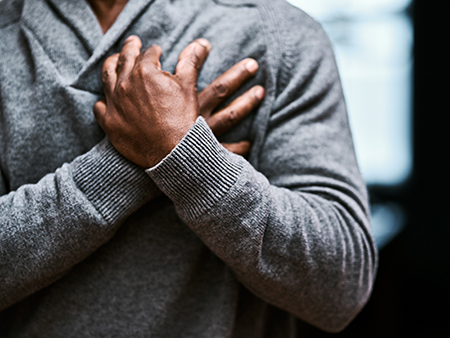Media contact: Adam Pope
 Mild or severe discomfort in the middle or left side of the chest that feels like fullness, pressure or squeezing could be a potential sign of a cardiovascular event.Most people experience chest pain at some point, but how do you know if it is a heart attack or simply heartburn or anxiety?
Mild or severe discomfort in the middle or left side of the chest that feels like fullness, pressure or squeezing could be a potential sign of a cardiovascular event.Most people experience chest pain at some point, but how do you know if it is a heart attack or simply heartburn or anxiety?
Understanding the differences between cardiovascular events and other causes of chest pain can save you a trip to the emergency room. It is also important because the discomfort could be caused by other urgent conditions, as well as less serious issues that may point to a chronic medical problem.
When it comes to cardiovascular causes of chest pain, UAB Medicine cardiologist Gregory Chapman, M.D., says “the usual suspects” include coronary artery blockages, high blood pressure, and heart valve or rhythm disorders. But there are plenty of other potential suspects. Chapman included a chapter on chest pain diagnosis in his book “A Strong and Steady Pulse: Cardiac Stories,” which is scheduled for publication in 2021.
“We have to consider non-cardio causes as we rule out the usual suspects,” Chapman said. “Not only because we might diagnose a specific medical condition for treatment later, but also because there may very well be an emergency at hand. The story doesn’t end as soon as you tell patients they are not having a heart attack. If you have an ulcer that is bleeding and causing severe pressure in the abdomen, as I saw with a female patient I discuss in the book, then that has to be treated immediately.”
Take symptoms seriously
In the United States, nearly 6 percent of emergency room patients report chest pain. More than half of those cases involve non-cardiac chest pain, or NCCP, that is caused by heartburn, anxiety or other issues. A staggering 80 percent of patients who complain of chest pain during primary care visits are simply experiencing NCCP.
However, the National Institutes of Health estimates that as many as 25 percent of emergency room patients with chest pain have acute coronary syndrome (ACS), a condition that reduces blood flow to the heart. These numbers highlight the dilemma for both patients and health care professionals: chest pain must be taken seriously, even if it turns out not to be serious.
Below are some signs of a potentially real cardiovascular event that warrant immediate medical attention:
- Mild or severe discomfort in the middle or left side of the chest that feels like fullness, pressure or squeezing; it lasts several minutes, ends, then returns
- Difficulty breathing, whether during rest or after physical activity
- Mild or severe chest pain that radiates into arms and neck or shoulders and into the jaws
- Nausea and dizziness
- Heavy sweating
- Weakness in limbs, loss of coordination
- All symptoms end and then return, continuing that cycle for several hours
The symptoms of a heart attack tend to increase in severity and duration as they fade and then return. The annoying pressure that may signal the onset of a heart attack can become stabbing pains. Radiating pain, nausea and shortness of breath might slowly grow to extreme levels.
 Gregory Chapman, M.D.Mimicking a heart attack
Gregory Chapman, M.D.Mimicking a heart attack
When chest pain turns out not to be a heart attack, it is good news; but it also might indicate that you need to talk with a doctor about what is causing the discomfort. Among the many causes of chest pain that do not involve a heart condition, some are emergency situations, while others are chronic conditions that range from serious illness to easily managed ailments. Some of the most common non-cardiac conditions that can feel like a heart attack include:
- Heartburn: One of the most frequent causes of chest pain is a type of indigestion that can feel as though your heart is on fire yet has nothing to do with the heart. Heartburn actually should be called “esophagus burn,” because it happens when stomach acid moves up into the tube that connects the throat to the stomach, causing a burning sensation, pressure and tightness in the chest near the heart. Your doctor can determine if you need treatment, such as medications for acid reflux or related conditions.
- Panic attack: This is a feeling of being out of control, with sudden overwhelming anxiety and fear. Physical symptoms may include increased heart rate, trembling, shortness of breath, weakness or dizziness, chest pain, sweating, and nausea. It is a disabling psychiatric condition with serious consequences that can affect your quality of life and lead to depression and thoughts of suicide. Your doctor may refer you to a mental health specialist, such as a psychiatrist or psychologist, who may recommend lifestyle changes, medication and/or counseling.
- Gallbladder disease, such as gallstones: Problems with this small organ can cause pressure or severe muscle spasms and pain in your upper right stomach area that may radiate into the chest.
- Peptic ulcer: These are painful sores that develop when acid in the digestive tract eats away at the lining inside your stomach, esophagus or small intestine. The most common symptom is stomach pain, which can radiate to the middle of your chest.
- Pulmonary conditions: Pneumonia, bronchitis, pleurisy and other lung infections can make breathing difficult and cause chest pain.
- Boerhaave syndrome: This is a rupture in the esophagus that often is caused by heavy vomiting. Other causes include weightlifting, epileptic seizures, abdominal trauma and childbirth, all of which can increase pressure in the esophagus and cause a rupture.
If you have an existing cardiovascular condition or are at high risk for a heart attack, you should call 911 or visit an emergency room as soon as you begin feeling chest pain. It is better to be safe than sorry.
To learn more about cardiovascular services at UAB Medicine, please visit uabmedicine.org/heart. To schedule an appointment with a UAB Medicine cardiologist, call 800-UAB-8816.